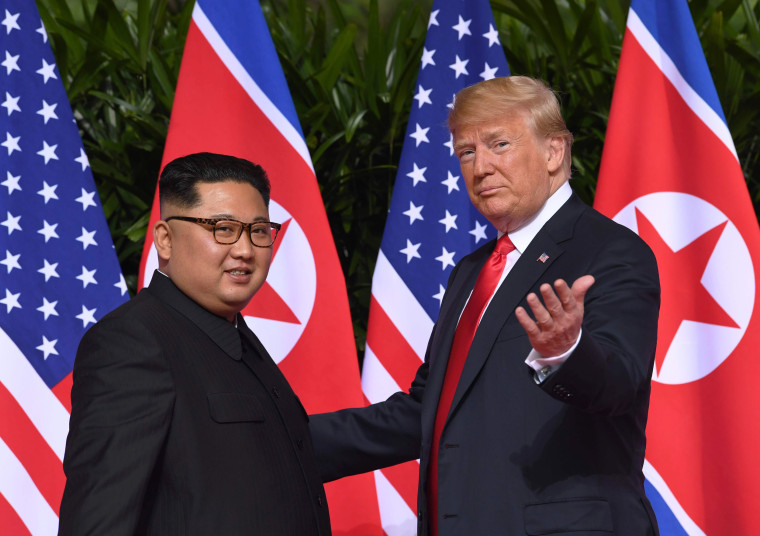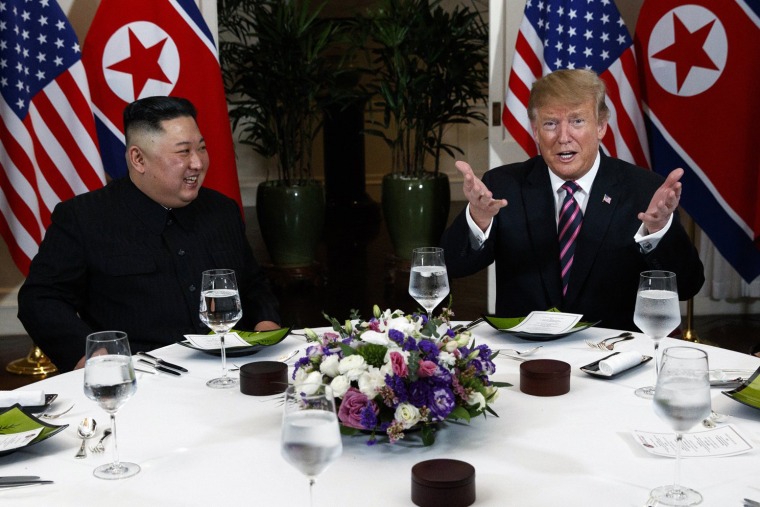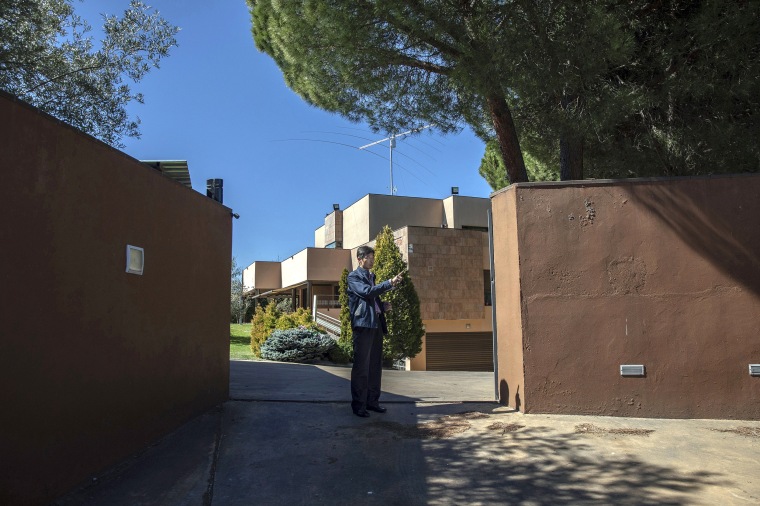WASHINGTON — An opposition group that stormed the North Korean embassy in Spain last month says it handed over data stolen from the raid to the FBI, and a law enforcement source familiar with the matter confirmed to NBC News that the bureau has received the information.
Receiving intelligence stolen from a foreign embassy in a NATO country puts the FBI in a delicate position, but there is no U.S. legal prohibition against the American government making use of the material, legal experts say.
Given the opaque nature of North Korea's security-obsessed regime, getting hold of information kept at one of its embassies could prove "pretty significant," said one former U.S. intelligence officer who spoke on condition of anonymity due to the sensitive nature of the topic.
North Korean embassies are prime targets of digital spying by the National Security Agency, current and former intelligence officials say. But North Korea is also known to use non-electronic, old-fashioned communication methods, so information on paper from the embassy could be valuable.
Thae Yong Ho, a former North Korean diplomat who defected to South Korea in 2016, recently wrote on his website that the intruders might have seized decryption computers that could unlock secret communications between embassies and Pyongyang.
The decryption devices are "considered more important than human lives," and their removal would represent "critical harm" to the regime, said Thae, the former deputy head of the North Korean embassy in Britain.
Spanish authorities have accused a 10-member gang of entering the embassy on Feb. 22 under a false pretext, beating and tying up the staff, trying unsuccessfully to persuade an accredited North Korean diplomat to defect, and making off with computers and digital files.
The anti-regime group, Free Joseon, or Free Korea, has claimed responsibility for the intrusion, though it denies beating or gagging any of the embassy personnel. The group, also known as Cheollima Civil Defense, portrays itself as a movement to liberate North Korea from an "immoral and illegitimate regime."
The group said on Tuesday it had no contact with any foreign government before the intrusion but said it had offered information of "enormous potential value to the FBI" after the raid.
Spain has issued two international arrest warrants in the case, one for a Mexican national residing in the U.S., Adrian Hong Chang, and the other for an American citizen. After lifting a secrecy order in the case, a Spanish investigating judge revealed the identities of seven of the alleged 10 intruders in a court document on Tuesday.
It remained unclear if the Spanish government identified the suspects in the raid through their own investigation or whether U.S. authorities had passed on the names of the alleged intruders.

The group has alleged the U.S. betrayed its trust after members approached the FBI.
"The organization shared certain information of enormous potential value with the FBI in the United States, under mutually agreed terms of confidentiality," the group said on its website. "This information was shared voluntarily and on their request, not our own. Those terms appear to have been broken."
Lee Wolosky, an attorney for Free Joseon and a former U.S. envoy for Guantanamo, told NBC News that "when all the facts come out regarding Madrid, it will be clear that the Spanish judge reached a number of inaccurate conclusions."
"Certainly the decicion of the Spanish judge to publicly disclose the names of those working in opposition to the Kim regime — which routinely assassinates its adversaries — was irresponsible and put these individuals in unnecessary jeopardy."
The FBI and the CIA declined to comment.
The embassy of Spain in Washington did not respond to requests for comment.
Experts who follow Korea and former intelligence officials said the members of the group had reason to fear for their lives given the track record of Kim Jong Un's regime, which has not hesitated to hunt down defectors and other opponents.
"They've become a bullseye target," said Sung-Yoon Lee of The Fletcher School at Tufts University.
"Who in the future would collaborate with the U.S. government were they ever to come into possession of high-value intelligence on North Korea obtained illegally?"
But a former senior U.S. official said it would be unusual for the U.S. to receive intelligence about an adversary and then "throw them under the bus." It was possible Spain had traced the identities of those involved, including from security cameras and flight passenger lists.
North Korea has not addressed the incident in state media. After the raid, the country's top three ambassadors at the U.N. mission in New York, Beijing and Moscow reportedly travelled back to Pyongyang for discussions.
It was possible the three envoys were summoned not only to confer after the recent summit between President Donald Trump and North Korean leader Kim Jong Un in Hanoi, but because confidential communications may have been compromised by the raid, according to Thae, the North Korean defector.
The raid took place only days before a second summit between Kim and President Donald Trump in Vietnam, which ended abruptly without an agreement on dismantling North Korea's nuclear and missile arsenal.
State Department spokesman Robert Palladino said on Tuesday the U.S. had nothing to do with the incident. When asked if the Trump administration had passed along the identities of the suspects to Spanish authorities, the State Department declined to comment.
The former U.S. intelligence official said the CIA definitely did not organize the operation, and the raid's timing and tactics did not reflect how the agency would operate.

The Free Jeosun group, which previously went by the name Cheollima Civil Defense, denied it had used violence in the operation at the embassy, saying, "All occupants in the embassy were treated with dignity and necessary caution."
On Thursday, the group said on its website it was temporarily suspending its activities but would continue to plan actions that would shake Kim Jong Un's regime "to its roots."
The alleged leader of the raid, Adrian Hong Chang, is a Yale-educated human rights activist who helped set up Liberty in North Korea, a non-profit dedicated to helping North Korean defectors. He was reportedly detained in China briefly trying to aid a group of North Korean defectors.
Hong Chang was a co-founder of Liberty in North Korea as a college student "but has had no involvement with the organization for over ten years," said Hannah Song, CEO of Liberty in North Korea.
"We have no knowledge of his recent activities, and we have no information on the Madrid Embassy incident other than what has been published by the media," she said in an email.
According to the Spanish investigating judge, Hong Chang and the other suspects allegedly bought knives, replica guns and various shackles when they visited Madrid earlier in February and used them in the operation. Hong Chang also requested a new passport at the Mexican Embassy in Madrid and when he registered with the Uber app, he used the moniker "Oswaldo Trump."
Two years ago, the group gained some attention after the assassination of the North Korean leader's older half-brother, Kim Jong Nam, in Malaysia. The brother was killed by a nerve agent attack, which the United States and others blamed on Pyongyang.
Afterward, Free Jeosun claimed credit for spiriting out the slain brother's family from their home in Macau to another country. But until the embassy raid last month, the group had remained obscure.
Now the organization is credited with penetrating the security of a North Korean embassy for more than four hours and removing potentially sensitive documents and hard drives. The raid was unprecedented for North Korea, experts said.
"The regime has got be concerned," said Bruce Bennett, a senior international researcher at the RAND Corp. think tank.
Whatever the value of the intelligence gathered from the Madrid embassy, the group has delivered an embarrassing black eye to a regime that portrays itself as unassailable, Lee said.
"They have made a chink in the North Korean armor, that taboo has been dented."


